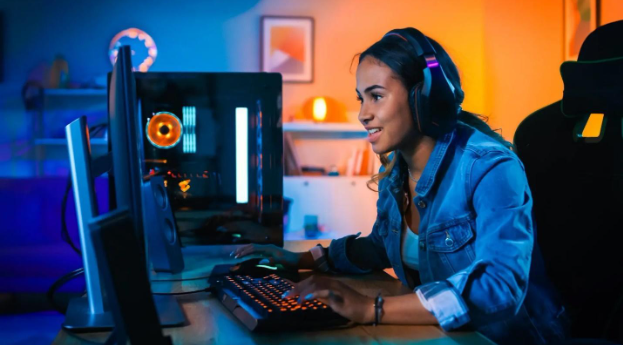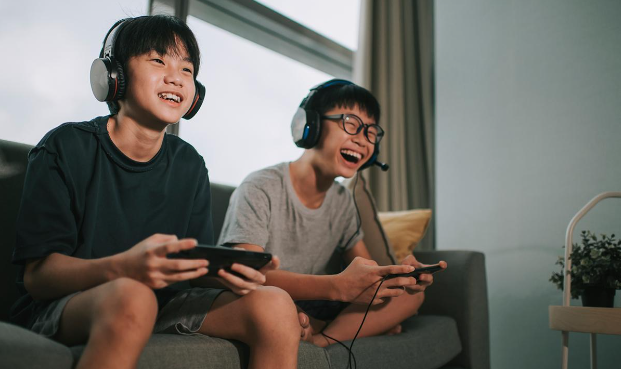according to blog of ranking, video games have become a staple in our daily lives, whether we’re battling dragons, solving puzzles, or teaming up with friends in a virtual world. The question arises: what exactly is the video games effect on mental health? Let’s dive into this complex topic, exploring both the positive and negative aspects while weaving in personal anecdotes and insights.
The Positive Effects of Video Games
Video games are not just pastimes; they can boost the quality of many cognitive skills. For example, most people will attest to the fact that they have encountered that exciting time when a tough issue arises in a strategic video game. Participating in these cases can enhance our thinking skills in solving problems and decision-making. According to my findings, there is considerable evidence that players get enhanced spatial and temporal resolutions, which make them respond faster, even in real-life situations.
Notably, video games have positive effects – they can help develop and improve social skills and even promote teamwork. Some games are played in teams and necessitate teamwork. This is because they are actionable, like “Overwatch” and “Fortnite.” We might recall evenings when, with friends brainstorming, group efforts made even a difficult raid a success. Such experiences not only enhance friendship bonds but also orient individuals in unique and essential social utility skills.
Stress decrease is another main advantage of gaming, according to the information mentioned above, in regard to the effect of video games on mental health. When the day is finished, and work is done, most of us run to our consoles or computers and turn them on for a moment of distraction. Sometimes, it is possible to have fun by playing a favorite game. Research indicates that playing video games can reduce stress levels and stress-related disorders, enabling one to have a break in a number of ways from the regular strain. It is true that emotional experience can result in self-esteem and confidence boosters, and novices recognize in-game goals or milestones.
Negative impacts of Video games
But again, one needs to look at the negative impact that gaming has physically. One of the greater concerns is addiction. However, the problem is when it gets to the level of addictive behavior, and most of us can afford that luxury every now and then. In such environments, the physical and temporal environments can melt away, and the next thing you know, important engagements have been … have been missed or loved ones neglected. While delving deeper into our favorite titles, it is always important to stay responsive to our gaming etiquette.
Social isolation is another concern. Although online gaming offers a sense of community, it can sometimes come at the expense of face-to-face interactions. We may find ourselves preferring the virtual company of our gaming friends over real-life connections, which can lead to feelings of loneliness and disconnection.
Mental health issues such as anxiety and depression have also been linked to excessive gaming when it comes to the video games effect on mental health. It’s essential to recognize that while gaming can be a form of escapism, it might not address underlying problems. Some players might use gaming to avoid real-life challenges, leading to a cycle of dependency rather than resolution. Additionally, gaming can disrupt sleep patterns, resulting in physical health problems like fatigue and decreased focus.
Factors Influencing the Impact of Video Games
The effects of video games can vary widely based on several factors. First, the content and genre of the gameplay play a crucial role. Action-packed shooters may trigger different responses than peaceful simulation games. Understanding the nuances of different genres can help us choose games that align with our mental health goals.
Individual differences also come into play. Personality traits, age, and gender can influence how we interact with games. For instance, younger players might be more susceptible to addiction, while older gamers may approach gaming with a more balanced perspective. Our gaming habits, including the frequency and duration of play, can further shape our experiences.
Finally, social support and relationships can significantly influence the impact of gaming on mental health. Engaging with friends or family members in gaming can enhance the positive effects, while isolation can exacerbate the negatives.
Balancing the Benefits and Risks
Finding a balance between the benefits and risks of gaming is crucial. Setting limits on gaming time can help establish healthy habits. Engaging in other activities, such as exercise or hobbies, can provide a well-rounded lifestyle that supports mental health.
For those who find themselves struggling with gaming addiction or mental health concerns regarding the video games effect on mental health, seeking professional help is essential. Mental health professionals can provide guidance and support tailored to individual needs, allowing us to develop healthier relationships with gaming.
Long-Term Implications of Video Gaming on Mental Health
It is, therefore, appropriate to shift the focus from the consequences of playing video games to the results that stem from this activity. This implies that long-term-oriented player-video game interaction could have potency in molding the player’s cognitive and emotional profile over the long run. For example, research shows that people who are predominantly gaming learn about better cognitive flexibility. One of the advantages of this cognitive flexibility is that it allows gamers to shift from one information set to another and from one task to another within gaming, but it is also useful in academic and/or working contexts.
Also, there has been much more acknowledgment of the usefulness of video games within the therapeutic recreation domain. The therapeutic use of serious games such as the “Re-Mission” game, specifically designed for young patients with cancer, shows that games can indeed reinforce the productive mastering of health knowledge and the practice of health behaviors. Such initiatives point out how gaming is not only entertainment but also a strong source of power.
Social Attitudes Towards Gaming
Perceptions on the culture of gaming have shifted a number of years back when we talk about subjects like the video games effect on mental health. At one point, video games could be considered simply as fun toys or, even more, detrimental to one’s health. However, as more research is done to discover the various pros that are associated with gaming most individuals appreciate the need for it. This is what we observe concerning the transformation in how educational institutions are adopting games as a means of delivering different curricula.

However, as any business, the gaming industry has the opportunity to build up a community as it develops. Hence, it is easier to establish relationships between the players around the globe and share knowledge and experiences with them. These interactions can make users feel like they belong, which is very important given that online some of them may feel lonely in the real world.
The Role of Game Design in Mental Health
The design of video games plays a crucial role in determining their impact on mental health. Games that incorporate positive narratives, cooperative play, and rewarding feedback systems can promote resilience and emotional growth. Titles that emphasize player choice and meaningful engagement can create a more immersive and fulfilling experience.
For instance, games like “The Legend of Zelda: Breath of the Wild” or “Celeste” provide not only entertainment but also profound emotional narratives that resonate with players. They encourage players to overcome obstacles, which can mirror real-life challenges and foster a sense of achievement and self-efficacy.
Conversely, games designed solely for competition and aggression may contribute to stress and anxiety, especially if players feel pressured to perform or win. This aspect underscores the importance of mindfulness in game selection considering the video games effect on mental health, urging players to choose games that align with their mental health needs.
Balancing Gaming with Other Life Aspects
Finding a balance between gaming and other life activities is critical for mental health. Engaging in a variety of activities—such as physical exercise, hobbies, and social interactions—can enhance overall well-being. For instance, integrating physical activity into gaming, like playing augmented reality games such as “Pokémon GO,” combines exercise with gaming, promoting a healthier lifestyle.
Encouraging players to engage in offline activities is also vital. Outdoor activities, arts, or volunteering can provide a sense of accomplishment and fulfillment that gaming alone might not offer. Striving for a balanced lifestyle allows us to harness the benefits of gaming while minimizing potential drawbacks.
Seeking Help and Community Resources
For individuals who may struggle with gaming addiction or mental health issues, seeking help is a crucial step. Many organizations and resources provide support for those affected. Community support groups, therapy focused on gaming addiction, and hotlines can guide individuals toward healthier gaming habits.
In addition, the rise of the healthy gamer movement emphasizes the importance of mental health within the gaming community. This movement encourages gamers to prioritize their well-being and fosters discussions around healthy gaming practices. Engaging with these resources can help players cultivate a positive gaming experience while addressing any mental health concerns.

Final Words
Video games hold the potential for both positive and negative impacts on mental health. By embracing the benefits—such as improved cognitive skills, enhanced social interactions, and stress relief—while remaining vigilant about the risks of addiction, social isolation, and mental health issues, we can cultivate a healthier gaming experience. Ultimately, it’s about finding the right balance that works for each of us, allowing video games to enrich our lives rather than detract from them when we discuss the video games effect on mental health.

